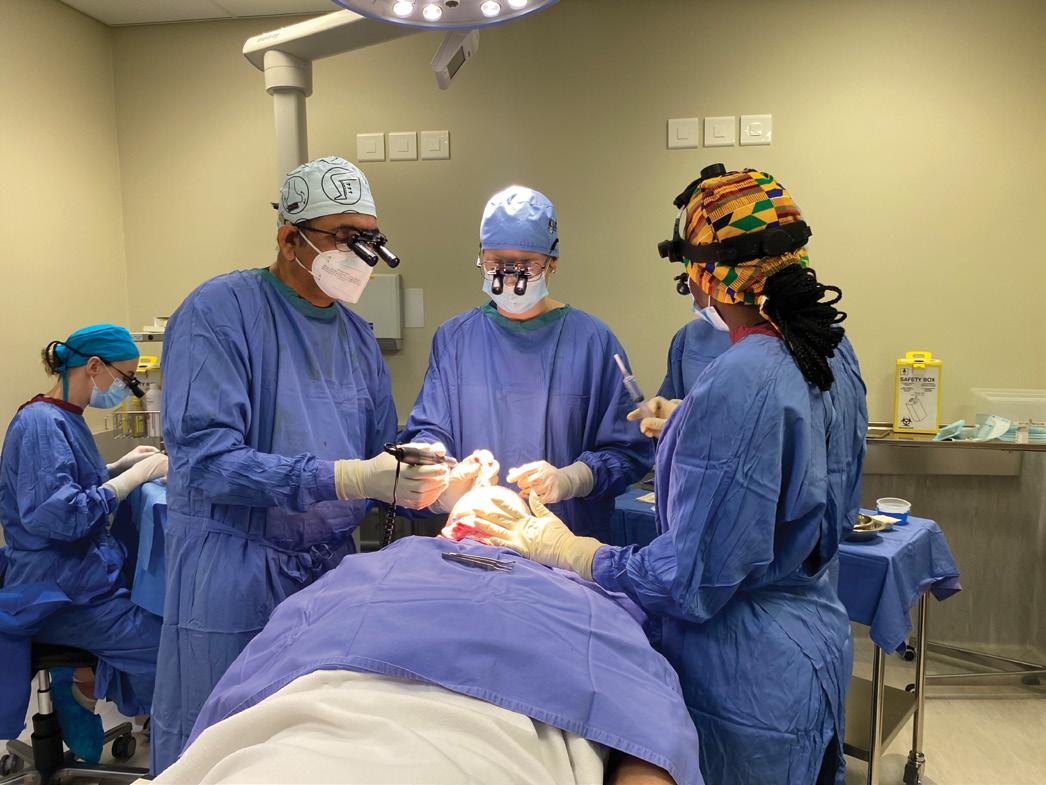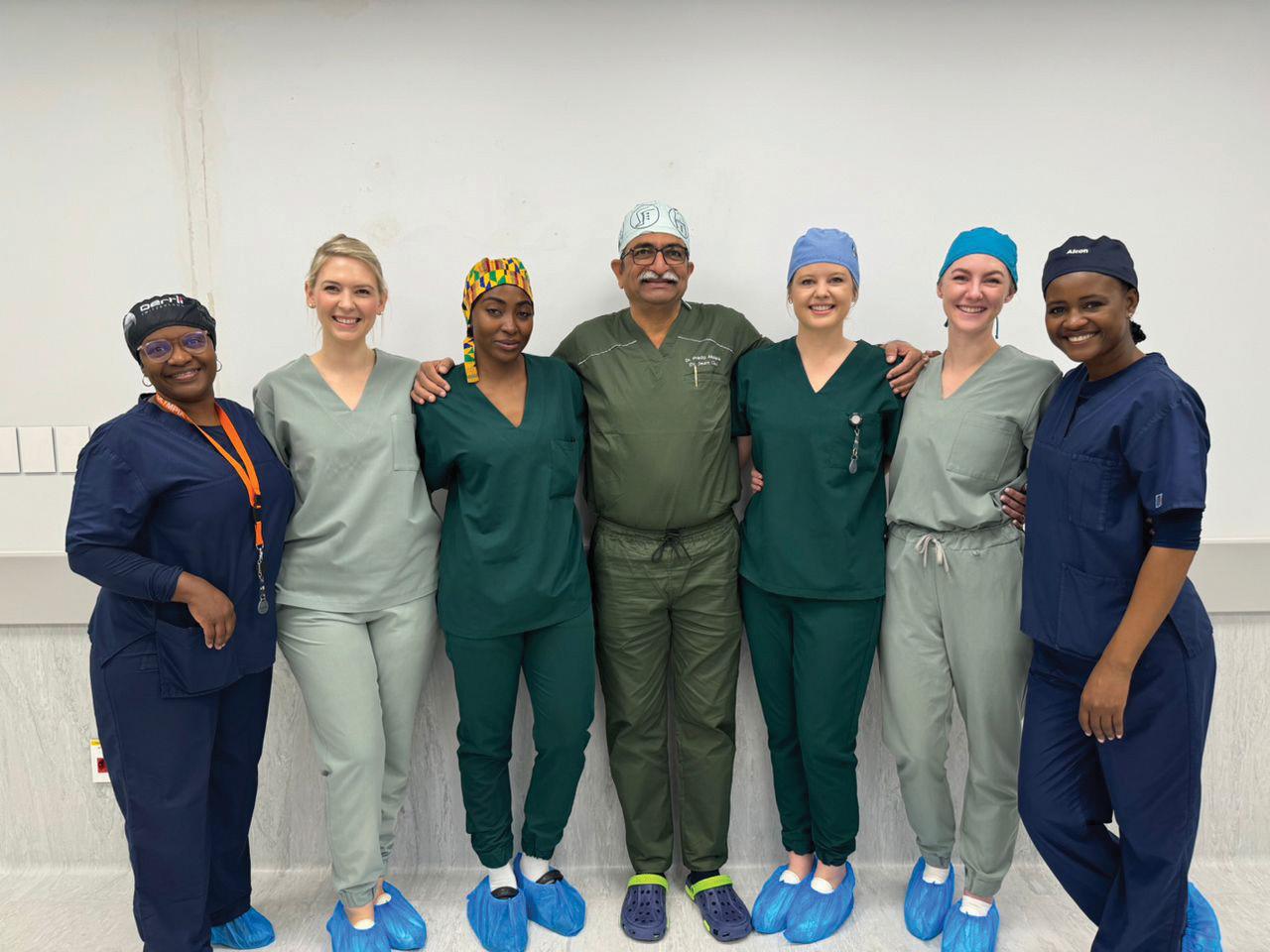
4 minute read
Restoring Confidence
Omake Moment with the Namibia Trade Network
Namibia made history with the successful completion of the country’s first-ever hair transplant surgery, performed at the Aesthetic Centre Olympia (ACO) late last year. While this milestone marks a new chapter in Namibian healthcare, it is not just about a groundbreaking medical procedure but much more about restoring dignity, boosting self-esteem and empowering individuals to reclaim their confidence.
For many Namibians, hair loss is more than a cosmetic issue. It is an emotional struggle that affects self-esteem and mental health. According to one of the key professionals involved in the pioneering procedure, Dr Natasha Slabbert, hair plays a significant role in how we see ourselves and how we feel others see us. “For many people, losing their hair isn’t just about aesthetics; it’s about identity and belonging,” she adds.
Across cultures, hair is deeply tied to personal identity, youth, vitality and social belonging. Thick, healthy hair is often associated with health, beauty and status, and its loss can profoundly affect how people perceive themselves and how they feel others perceive them.
Dr Slabbert explains, “When you lose your hair, you’re not just losing something physical; you’re losing part of your identity. This can impact your emotional wellbeing and, in some cases, even contribute to anxiety and depression.”

Another key member of the team, Dr LaToya Mwoombola-Hamutenya, agrees:
“The emotional and psychological impact of hair restoration can’t be overstated. We’ve had patients tell us that this treatment has changed their lives, giving them the confidence to pursue opportunities, improve relationships and even take on new challenges that they had previously shied away from.”
What hair loss means
Hair loss is linked not only to ageing but also to stress, anxiety and depression. Studies show that the quality of our hair can influence how we feel about ourselves, and in turn, how we navigate the world. Thinning or damaged hair can exacerbate existing mental health challenges, while restoring hair can have a significant positive impact on mental health.
This breakthrough is not just about surgery; it is about empowerment and giving people the tools to feel better about themselves. Dr Jonathan Joffe, the owner of the Olympia Eye & Laser Centre, where the procedure took place, supports this view: “At ACO, we’re not just transforming appearances – we’re helping to restore a sense of self-worth and self-confidence that can have a ripple effect across our patients’ lives. It’s empowering individuals to be their best selves, and that’s what makes this treatment so powerful.”
By providing a local solution to hair loss, Namibia now not only offers medical care but also hope for people who may have felt embarrassed or discouraged by their appearance.
Building capacity in Namibian healthcare
The procedure itself was a complex and delicate process. At the heart of this achievement was the training and guidance of Dr Pradip R. Atodaria, a world-renowned hair transplant surgeon from Surat, India. Dr Atodaria’s 27 years of experience and mastery of the advanced follicular unit extraction (FUE) technique were instrumental in training the Namibian team. This minimally invasive method involves the precise extraction and implantation of individual hair follicles, producing natural-looking results with minimal scarring.
Dr Slabbert, alongside Dr Mwoombola-Hamutenya, aesthetician Esmarie Smit and their supporting nurses, Jacobina Nampala and Armas Shifotoka, underwent rigorous training in FUE techniques under Dr Atodaria’s mentorship. As a result, they now boast a remarkable 95% success rate in harvesting follicular units – a figure that aligns with global standards of excellence.

By providing a local solution to hair loss, Namibia now not only offers medical care but also hope for people who may have felt embarrassed or discouraged by their appearance. The ability to undergo a hair transplant procedure right here in Namibia removes the financial barrier and emotional burden of seeking treatment abroad.
It is inspiring to see that Namibia is continuing to build capacity in its healthcare system that extends beyond physical health to include emotional and psychological healing as well. The collaboration between skilled local professionals and renowned international experts underscores the power of knowledge exchange and the growing potential of Namibian healthcare.










